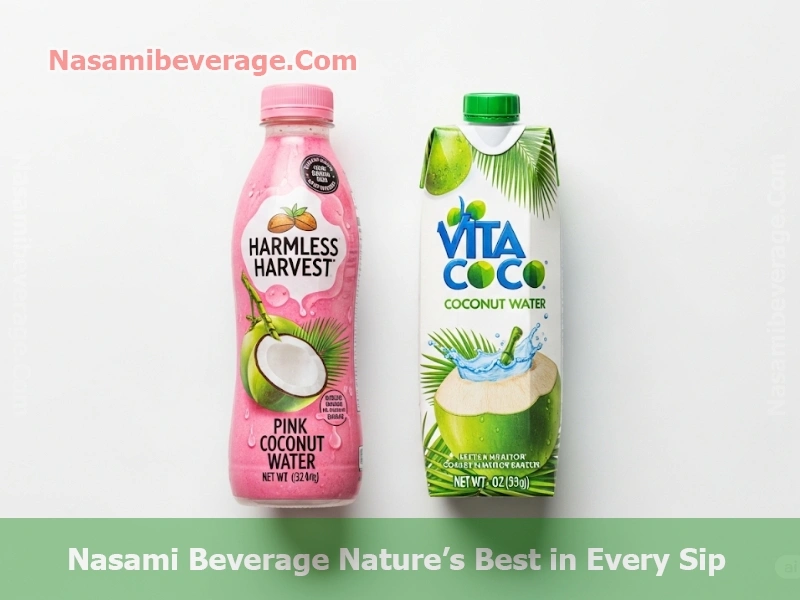From celebrity endorsements to its place on supermarket shelves, coconut water has surged in popularity as a go-to wellness beverage. But beyond the tropical hype, many of us are still wondering, are coconut water good for you, really?
At Nasami Beverage, we believe in making informed choices about what we drink. This guide will take you through a detailed exploration of this popular tropical drink, separating fact from fiction and helping you decide if it’s the right choice for your lifestyle.
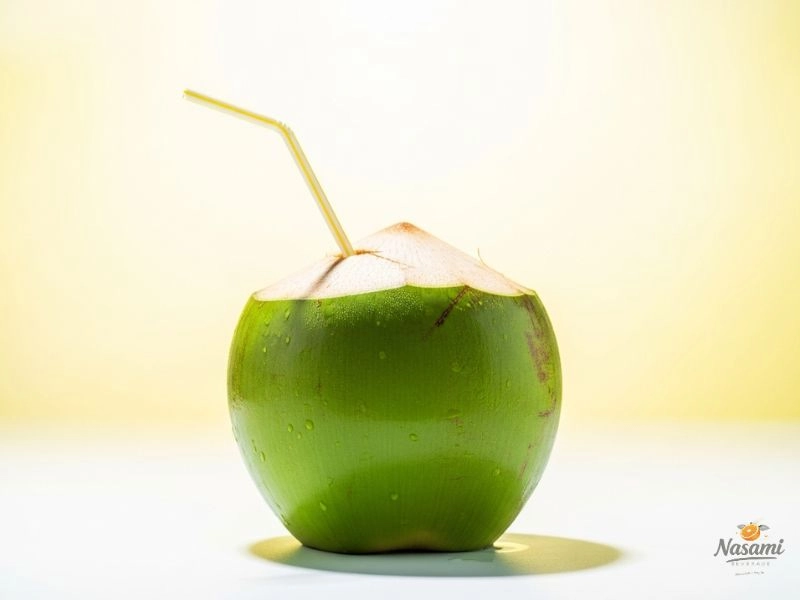
What Exactly Is Coconut Water?
Before we dive into its benefits, it’s important to understand what coconut water is. It’s not to be confused with its richer, fattier cousin, coconut milk.
The clear liquid from young, green coconuts
Coconut water is the clear, slightly sweet liquid found inside young, green coconuts. This natural fluid serves as the nourishment for the coconut as it matures.
As the coconut ages, this water is gradually replaced by the white, fleshy coconut meat from which coconut milk and oil are derived.
Difference between coconut water and coconut milk
The distinction is crucial. Coconut water is about 94% water and is very low in fat. Coconut milk, on the other hand, is an emulsion created by grating the white flesh of a mature coconut and mixing it with water.
It has a much higher fat and calorie content and a thicker, creamier consistency. They are used very differently in cuisine and have vastly different nutritional profiles.
A Deep Dive into the Nutritional Profile of Coconut Water
The primary appeal of coconut water lies in its unique nutritional makeup. It’s more than just flavored water; it’s packed with key nutrients that can contribute to your health.
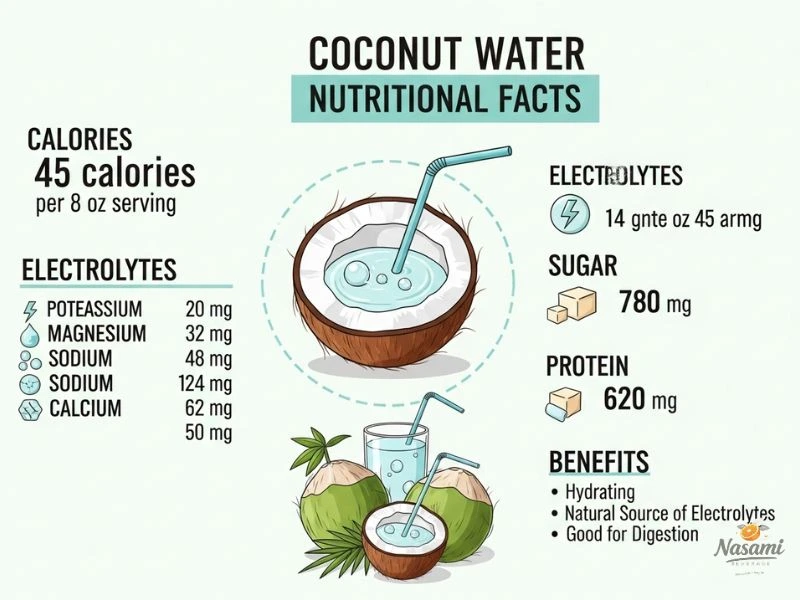
Calorie content and macronutrients (carbohydrates, protein, fat)
An average cup (about 240ml) of unsweetened coconut water contains approximately 45-60 calories. The majority of these calories come from naturally occurring sugars (carbohydrates). It contains minimal protein and is virtually fat-free, making it a light beverage choice.
Rich in electrolytes: potassium, magnesium, sodium, and calcium
This is where coconut water truly shines. It is a natural source of electrolytes, which are minerals vital for numerous bodily functions, including maintaining proper fluid balance and muscle function. It is particularly rich in potassium, often containing more than a banana. It also provides a good amount of magnesium, with smaller amounts of sodium and calcium.
Vitamins and minerals present in coconut water
Beyond electrolytes, coconut water contains small amounts of other essential micronutrients, including Vitamin C and some B-vitamins. It also provides trace minerals like manganese, which is important for bone health and metabolism.
The Health Benefits of Drinking Coconut Water: So, Are Coconut Water Good For You?
The rich nutrient profile of coconut water translates into several potential health benefits that have captured the attention of health-conscious consumers and researchers alike.
Superior Hydration and Replenishing Electrolytes
Proper hydration is fundamental to health, and coconut water’s composition makes it an excellent choice for rehydrating the body. The electrolytes it contains, especially potassium and sodium, are crucial for directing water to the areas of your body that need it most.
This makes it particularly effective for rehydration after a day in the sun or during a mild illness. Many people now consider using coconut water for dehydration instead of traditional options.

A Natural Alternative to Sports Drinks?
For casual exercisers, coconut water can be a great natural alternative to sugary sports drinks. It helps replenish fluids and electrolytes lost through sweat.
However, for intense, prolonged endurance activities (over 90 minutes), traditional sports drinks may have an edge due to their higher sodium and carbohydrate content, which are specifically formulated for rapid energy replacement and rehydration.
Can Coconut Water Aid in Weight Loss?
As a low-calorie, low-fat beverage, coconut water can certainly be part of a healthy weight management plan. Swapping high-calorie drinks like soda or sweetened juices for coconut water can significantly reduce your daily calorie intake.
Some proponents also suggest it may slightly boost metabolism, though more research is needed to confirm this effect. Exploring coconut water and other natural beverages can be a great step; for example, you can discover more healthy drinks on our blog.
The Secret to Glowing Skin?
Hydration is a cornerstone of healthy skin, and coconut water’s hydrating properties can contribute to a more supple and radiant complexion from the inside out. Furthermore, the presence of antioxidants may help combat cellular damage, while some studies suggest the cytokinins found in coconut water could have anti-aging effects on human cells, though more direct research on skin is needed.
Potential Heart Health Benefits
The high potassium content in coconut water can play a role in managing blood pressure. Potassium helps to counteract the effects of sodium, promoting the excretion of excess sodium from the body and easing tension in blood vessel walls, which can help lower blood pressure.
May Help Prevent Kidney Stones
Staying adequately hydrated is the most important rule for preventing kidney stones. Some studies suggest that coconut water may be even better than plain water at preventing the formation of the crystals that lead to kidney stones. It’s believed to help flush out citrate, potassium, and chloride, preventing them from binding and forming stones.
Potential Downsides and Risks to Consider
While generally healthy, coconut water isn’t a magic elixir. It’s important to be aware of potential downsides, especially when consumed in large quantities.
When Too Much of a Good Thing is Bad: Potential Side Effects
For most people, coconut water is safe and well-tolerated. However, drinking it in excess could lead to a laxative effect due to its high potassium content. It can also cause stomach upset or bloating in some individuals.
High in Potassium: A Concern for Individuals with Kidney Issues
The high potassium level is a significant benefit for most but can be dangerous for those with kidney disease or impaired kidney function.
Damaged kidneys are unable to remove excess potassium from the blood effectively, which can lead to a dangerous condition called hyperkalemia. Anyone with kidney issues should consult a doctor before adding coconut water to their diet.
Calorie and Sugar Content: Choosing the Right Kind
While lower in sugar than most fruit juices and sodas, the calories and sugar in coconut water can add up if you drink a lot of it.
It is crucial to choose unsweetened varieties. Many flavored or branded versions contain added sugars, which negate many of the health benefits and add empty calories.
Allergic Reactions and Other Considerations
Although rare, allergies to coconut, which is a tree nut, do exist. Individuals with tree nut allergies should exercise caution.
How to Choose the Best Coconut Water
The quality of your coconut water matters. Navigating the crowded beverage aisle can be tricky, but knowing what to look for makes it simple to find the best product.
Reading the Label: What to Look For (and Avoid)
The most important tip is to check the ingredients list. The ideal product should have only one ingredient: coconut water. Look for terms like “100% coconut water” or “not from concentrate.” Be wary of products with “added sugar,” “natural flavors” (which can hide sugar), or a long list of ingredients.
When considering what type of coconut water is best, always prioritize purity. Choose options that are 100 pure coconut water to ensure you’re getting all the benefits without unnecessary additives.
Popular Brands on the Market
You’ll find many brands on the shelf, including giants like Vita Coco and Zico, as well as brands praised for their commitment to quality and taste, such as Harmless Harvest, C2O, and Taste Nirvana. Each offers a slightly different taste profile depending on the source of the coconuts and the processing method (like pasteurization or high-pressure processing). It’s worth trying a few to find your favorite.
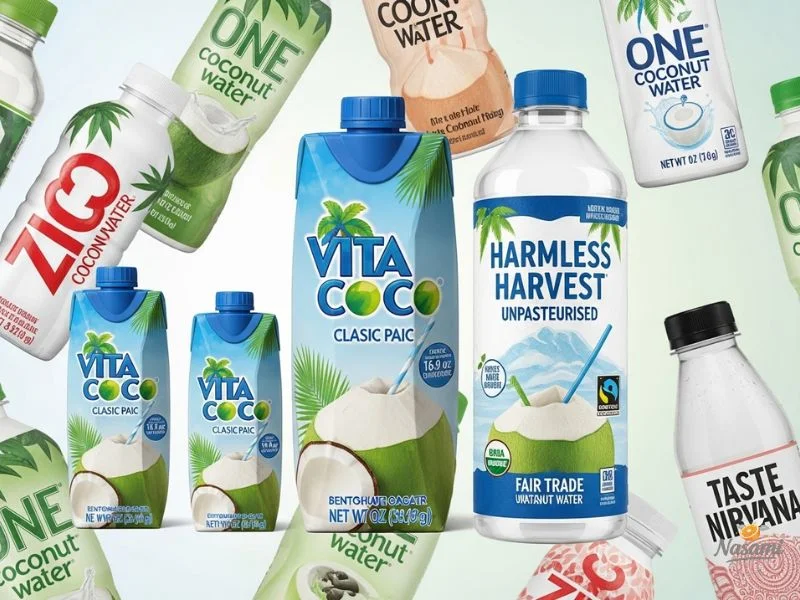
Creative Ways to Incorporate Coconut Water into Your Diet
Beyond just drinking it straight, coconut water is a versatile ingredient that can add a touch of natural sweetness and a nutritional boost to various recipes.
- As a refreshing standalone beverage: The simplest way! Serve it chilled for the best taste.
- In smoothies and juices: Use it as a liquid base for your morning smoothie instead of plain water or milk. It pairs wonderfully with fruits like pineapple, mango, and berries.
- As a base for cocktails and mocktails: Its light, sweet flavor makes it a fantastic mixer for refreshing summer drinks.
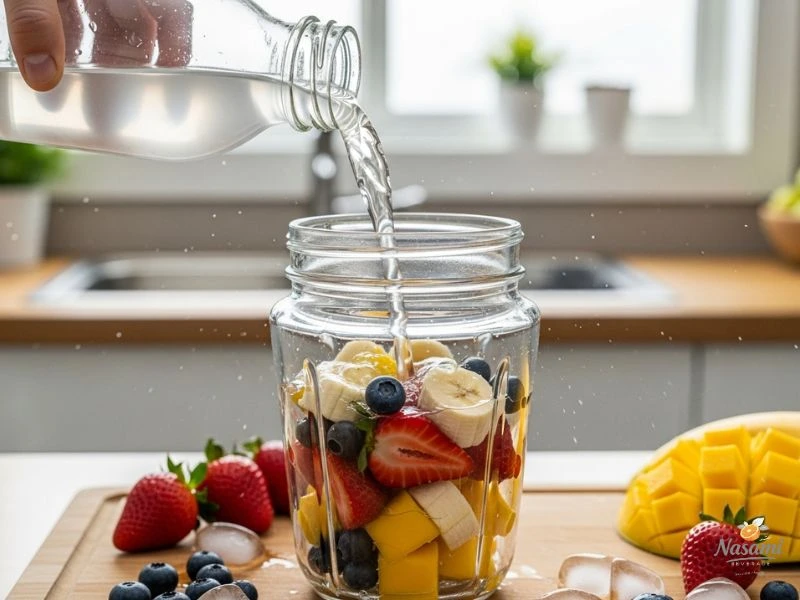
The Bottom Line: Is Coconut Water a Healthy Choice for You?
So, we return to our original question. For the average person, coconut water is a very healthy choice. It’s a fantastic, natural source of hydration and electrolytes, particularly potassium.
It serves as a superior alternative to sugary, processed drinks and can be a valuable addition to a balanced diet, potentially offering benefits for heart health, skin, and more.
However, it’s not a miracle cure-all. Moderation is key, and it’s essential to choose unsweetened varieties to avoid hidden sugars. Individuals with kidney conditions must avoid it. For elite athletes, it may not be sufficient for rehydration after intense exercise.
As Thomas Edison once said, “The doctor of the future will no longer treat the human frame with drugs, but rather will cure and prevent disease with nutrition.” Choosing natural, nutrient-dense beverages like pure coconut water is a step in that direction.
Frequently Asked Questions (FAQs)
Is it okay to drink coconut water every day?
For most people, drinking coconut water daily in moderation is generally safe and can be a good way to stay hydrated and get extra potassium. However, individuals with kidney problems or those on potassium-restricted diets should consult their doctor.
Is coconut water better than regular water for hydration?
While coconut water contains electrolytes that can aid in rehydration, for casual hydration, plain water is just as effective and has no calories. After intense, prolonged exercise where significant electrolytes are lost, coconut water can be a good option, but it is lower in sodium than traditional sports drinks.
Can coconut water help with weight loss?
Coconut water can be a part of a weight loss plan as a low-calorie alternative to sugary drinks like sodas and juices. Its potential to boost metabolism and promote a feeling of fullness may also contribute to weight management.
Does coconut water improve skin health?
Some anecdotal evidence and preliminary research suggest that the vitamins, minerals, and hydrating properties of coconut water may contribute to healthier, more radiant skin by improving hydration and providing antioxidants.
